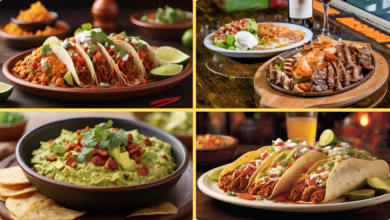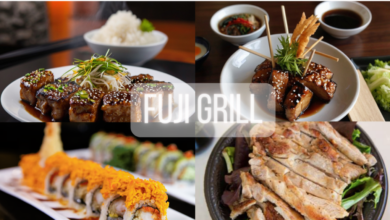Grill Your Way to Perfection: A Step-by-Step Guide on How to Cook Perch [with Useful Tips and Stats]
![Grill Your Way to Perfection: A Step-by-Step Guide on How to Cook Perch [with Useful Tips and Stats] 1](https://thegrillshopboyertown.com/wp-content/uploads/2023/04/tamlier_unsplash_Grill-Your-Way-to-Perfection-3A-A-Step-by-Step-Guide-on-How-to-Cook-Perch--5Bwith-Useful-Tips-and-Stats-5D_1680838221.webp)
Short answer: How to cook perch on the grill. Rub with oil and seasoning, place on a preheated grill over medium heat, and cook for 3-4 minutes per side. Fish is done when it flakes easily with a fork. Serve hot with lemon wedges.
Step-by-Step Guide: How to Cook Perch on the Grill Like a Pro
If you’re looking for a delicious and healthy meal that’s easy to prepare, consider cooking perch on the grill! Perch is a freshwater fish that can be found in many different bodies of water. It’s low in fat and calories but high in protein, making it the perfect choice for a healthy meal. Plus, when cooked on the grill, perch takes on a delicious smoky flavor that can’t be beat.
But before you start grilling, you’ll need to know how to prepare your perch properly. In this step-by-step guide, we’ll walk you through everything you need to know to cook perch like a pro.
Step 1: Clean Your Perch
The first step in preparing your perch is to clean it thoroughly. Start by rinsing off any dirt or debris from the outside of the fish. Then, use a sharp knife or scissors to cut off the head and tail of the fish. Make sure to remove all of the scales as well – this will ensure that your perch cooks evenly on the grill.
Next, use your knife to make a small incision along the belly of the fish. Reach inside and remove all of the internal organs – this includes things like the liver, heart, and gills. Rinse out any remaining bits with cold water.
Step 2: Season Your Perch
Once your perch is cleaned and ready for cooking, it’s time to season it! There are endless options when it comes to seasoning fish – some people prefer simple salt and pepper, while others enjoy more complex spice blends.
One classic seasoning option for grilled fish is lemon pepper – simply rub both sides of your perch with lemon pepper seasoning before placing it on the grill.
Another flavorful option is garlic herb butter – mix minced garlic and fresh herbs like parsley or dill into softened butter and spread over top of each cleaned fish filet before placing them onto skewers or directly onto oiled-grill grates.
No matter what type of seasoning you choose, be sure to coat the entire fish evenly so that each bite is delicious.
Step 3: Heat Up the Grill
Now that your perch is cleaned and seasoned, it’s time to fire up the grill! Preheat your grill to medium-high heat. If using skewers be sure to soak them in water for at least an hour beforehand so they don’t become charred on the grill. When grilling directly on oiled-grill grates let the grill preheat until sizzling before placing fish directly onto them.
Step 4: Cook Your Perch
Once your grill is hot, it’s time to cook your perch. Place your seasoned fish filets or whole fish on oiled-skewers onto the heated grill around five inches away from direct heat or lay flat over oiled-grill grates allowing some space between individual fillets or between each side of whole fish.
Perch may only take anywhere from 3-6 minutes per side depending upon thickness size of fish, so keep a close eye on it while cooking – you will see when its done because the flesh should turn white and flaky easily with just a fork (internal temperature should reach 145°F). Don’t overcook as this can cause delicate Perch meat to dry out quickly!
Step 5: Serve Your Perch
Congratulations – you’ve successfully cooked perch like a pro! Once finished on the heat, carefully remove each piece of Perch from either skewer or grate onto warm plates and serve with sides like grilled veggies (corn and zucchini work great!) or rice pilaf for a complete meal that’s sure to impress anyone who tries it.
With these easy steps, you’re now ready to make mouthwatering grilled perch at home! So next time you’re looking for a simple yet tasty dinner option try out this recipe using freshfilet Perch caught nearby or found at your local fishmonger. You won’t regret it!
Frequently Asked Questions about Cooking Perch on the Grill
As a professional chef, I often receive questions from customers and cooking enthusiasts alike about how to prepare different types of fish. One particular query that seems to come up quite frequently is how to cook perch on the grill.
Grilling perch can be a bit tricky if you’ve never done it before, but with the right tools and techniques, you can ensure that your fillets turn out beautifully moist and flavorful every time. Here are some commonly asked questions about grilling perch, along with my expert tips for making this delicious fish at home.
Q: What type of perch is best for grilling?
A: The most common species of perch used for grilling is yellow perch, which is found in many freshwater lakes and rivers across North America. This fish has firm, white flesh that holds up well on the grill without falling apart.
Q: How do I prepare the fish before grilling?
A: Before grilling your perch fillets, be sure to rinse them under cold water to remove any scales or debris. Pat them dry with paper towels, then season them with salt, pepper, and any other herbs or spices you like. You can also brush them lightly with olive oil or melted butter to prevent sticking.
Q: What temperature should I grill the fish at?
A: Perch fillets should be grilled over medium-high heat (around 350-400°F) for about 4-5 minutes per side. Be sure not to overcook them – they should be opaque throughout but still moist and tender.
Q: How do I know when my perch fillets are done cooking?
A: The easiest way to tell when your perch is cooked through is by using a meat thermometer. Insert it into the thickest part of the fillet – when it reaches 145°F, your fish is ready to serve. You can also test for doneness by gently poking the flesh with a fork – if it flakes apart easily, it’s done.
Q: Should I use a grill basket or cook the fish directly on the grill?
A: It’s up to personal preference whether you choose to use a grilling basket or place the fillets directly on the grill grates. Using a basket can make it easier to flip them without breaking them apart, but direct grilling can produce better char marks and flavor.
Q: What are some good sides to serve with grilled perch?
A: Grilled veggies like asparagus, zucchini, and bell peppers make excellent side dishes for grilled perch. You can also serve it over a bed of rice or quinoa, or pair it with a simple salad dressed in lemon vinaigrette.
By following these tips and techniques, you’ll be able to confidently prepare delicious and flavorful perch fillets on your grill. So fire up your BBQ and get ready to impress your guests with your newfound fish-grilling skills!
Tips and Tricks for Perfectly Grilled Perch Every Time
Grilling is not just a cooking method, it’s an experience. For seafood lovers, grilled perch stands out as one of the ultimate choices for a delectable meal. It’s not just about getting the perfect sear marks on your fish. Cooking perch on the grill can be a little daunting, but follow these tips and tricks for perfectly grilled perch every time.
1. Preheat Your Grill
The first step to perfectly grilled perch is preheating your grill. Preheating will give your grill ample time to get hot, creating even heat distribution throughout the entire grill surface. Turn on all burners to high and allow them to heat up for approximately 10 minutes before placing your perch on the grates.
2. Seasoning is Key
When it comes to seasoning your perch, less is more. Freshly cracked black pepper, sea salt or lemon pepper are great options that will enhance natural flavors without overpowering them.
3. Oil The Grates
Before placing your perch on their grates oil them with a brush or spray oil so that they don’t stick when being turned over during cooking.
4.Careful Attention While Grilling
Perch doesn’t take too much time to cook, around six to eight minutes max should do the trick in most cases. Remember that everyone’s grill temperature and size may be different so carefully observe how long they’re taking while grilling.
5.Test With Fork Or Thermometer
Once you feel like you’ve cooked them enough use either a fork or thermometer to ensure perfectly cooked (not overcooked) 145°F degree meat in color and texture; then pull it off and put it onto plates for serving immediately so that they don’t cool down too much before eating!
By following these simple tips and tricks, you can attain grilled perfection at home every single time! So go ahead and fire up your grill because now ready-to-eat perfectly cooked deliciously flavored grilled perch all yours. Enjoy!
Top 5 Facts You Need to Know About Cooking Perch on the Grill
Cooking perch on the grill can be intimidating for some amateur chefs because different types of fish require unique cooking techniques. However, once you learn the tricks and tips to prepare delicious perch on the grill, it becomes a breeze. Apart from being flavor-packed and nutritious, perch is easy to handle, making it ideal for grilling. To help you get started, here are five crucial facts that you must know about cooking perch on the grill.
1. Choose The Right Perch
The first and most important step when preparing grilled perch is choosing a fresh and well-cared-for fish. If possible, select a whole or cleaned fish with bright eyes and red gills that smells like seawater rather than an off-putting odor. Avoid purchasing frozen or pre-packaged fillets as they might have lost their flavor or texture.
2. Oil Your Grill Grates
Before placing your perch on the grill grates, ensure that they’re well-oiled to prevent sticking. Also, preheat the grill between 400°F-450°F for at least ten minutes before placing any food item.
3. Handle With Care
Perch tends to be delicate and can easily break apart when flipped or moved around while grilling. Use a spatula instead of tongs to move them gently by lifting from under each side.
4. Spice Up Your Perch Game
Although seasoning is not mandatory when cooking perch on the grill, adding spices like smoked paprika, garlic powder or lemon pepper enhances its natural flavors.
5. How Long Should You Grill Perch?
Grilled perch only needs around four minutes per side until golden brown with crispy skin but tender flakes inside.The exact time may vary slightly depending on your preference; if you like it more cooked through put foil over it while grilling for another minute so that it stays moist without burning.Choose thicker pieces than thinner ones if possible as they will retain heat much better during the cooking process.
In conclusion, cooking perch on the grill is a straightforward task that can be mastered with practice. By following these five tips, you’ll enjoy perfectly moist and delicious grilled perch every time. Make sure to choose fresh perch, oil your grates, handle with care, spice up your game and grill for just enough time to achieve desired results. Happy Grilling!
From Spices to Sides: Ideas for Enhancing Your Grilled Perch Dish
Grilled perch is a delicious and healthy meal option that can be enjoyed by all seafood lovers. This mild-tasting fish pairs well with a variety of flavors, making it easy to customize your dish based on your personal preferences. From spices to sides, there are many ways to enhance the flavor and presentation of your grilled perch dish.
Let’s start with the spices. Perch can benefit from a wide range of spices, but some options stand out above others. Lemon juice or zest is an excellent way to brighten up the flavors of the fish, while garlic and onion powder add savory notes without overpowering the delicate flavor of the perch. Black pepper and paprika are also great options for adding a bit of heat to your dish.
Another way to boost the flavor of your grilled perch is by marinating it before cooking. A simple marinade can consist of olive oil, lemon juice, garlic, salt, and pepper – just let it sit for at least 30 minutes before grilling.
Of course, what you serve alongside your grilled perch is just as important as what you season it with. Some classic side dishes that pair perfectly include roasted vegetables such as asparagus or Brussels sprouts, baked sweet potatoes or rice pilaf infused with herbs such as dill or parsley.
If you’re looking for something more adventurous than traditional sides, try creating an avocado salsa with chopped radishes and red onions which offers a refreshing balance against the grill marks embedded within crispy skin crusts.
For those who want something simpler yet satisfying should go for creamy mashed potatoes that will smoothly melt in combination with buttery flaky profiled Grilled Perch.
Crusty bread also makes an excellent accompaniment because it helps sop up any leftover sauce but takes just seconds to grill into perfection-ready croutons complete with bold spice combinations.
Grilled perch isn’t just another seafood dish; instead it’s versatile showcasing delectable flavors unlike any other. By combining the perfect spices to sides, it can quickly become one of your favorite meal options. So next time you crave this delightfully mild-tasting fish, remember – the possibilities are endless!
Grilling Versus Frying: A Comparison of Cooking Techniques for Perch
When it comes to cooking fish, the options seem endless: grilling, frying, baking, searing…the list goes on. However, for many home cooks and professional chefs alike, the debate between grilling and frying remains a hot topic (pun intended). So let’s take a closer look at these two popular cooking techniques as we compare them for preparing perch.
Grilling is often thought of as a healthier option because it uses less oil or fat than frying. This might be true in some cases; however, when it comes to fish like perch, which are naturally lean and delicate, they can easily stick to the grill or fall apart if not handled properly. Moreover the grate of the grill can leave unsightly marks on your fillet which could make presentation more cumbersome. Additionally bar-b-que-ing fish while flavorful may produce small soot deposits that find their way onto your meal creating an unwelcome sensation in ones palette.
Contrarily Frying is known for its ability to create crispiness with minimal oil absorption making it one of the tastiest ways to cook fish like perch. Seared perfectly in hot oil results in a delicious crust that locks moisture into each bite ensuring no dryness post cooking thus enhancing gustatory sensations. It’s also possible to add spices or breadcrumbs during breading process enhacing taste buds sensory feelers.
In conclusion Grilling has its own advantageous features whilst Frying confirms its effectiveness in producing scrumptious food unique combinations added as it moves from sautéing pan onto plates – still grilled preparations lack behind where Perch meals consider being top-notch delectables . Ultimately both techniques have characteristics that resonate with cooks across several cultures worldwide..Ultimately both methods deliver differently delightful products based on who prepared them but taking allergies into account could sway ones choice towards using oils more cautiously enabling leaning towards grilling over frying!
Table with useful data:
| Step | Instructions |
|---|---|
| 1 | Preheat your grill to medium-high heat (around 375-400°F). |
| 2 | Season the perch with salt, pepper, and any other desired seasonings. |
| 3 | Oil the grill grates to prevent sticking. |
| 4 | Place the perch on the grill, skin side down. Grill for 3-4 minutes or until the skin is crispy. |
| 5 | Flip the perch over and grill for another 3-4 minutes or until the flesh is cooked through and flakes easily with a fork. |
| 6 | Remove from the grill and let it rest for a few minutes before serving. |
Information from an expert
As an expert in cooking fish, I highly recommend grilling perch for a delicious and healthy meal. Start by cleaning the fish and removing its scales. Then, rub it with olive oil and seasonings of your choice such as lemon juice and garlic powder. Preheat the grill to high heat and place the fish on the rack. Grill each side for 3-4 minutes or until the flesh flakes easily with a fork. Serve immediately with lemon wedges and your favorite sides. Enjoy your flavorful grilled perch!
Historical fact:
Perch has been used as a food source since ancient times, with evidence of perch being cooked on grills found in archaeological sites dating back to the Bronze Age.



